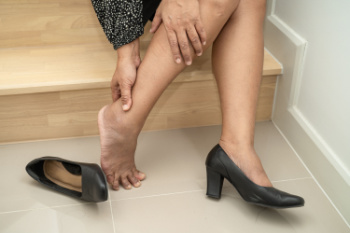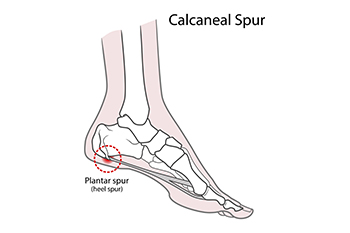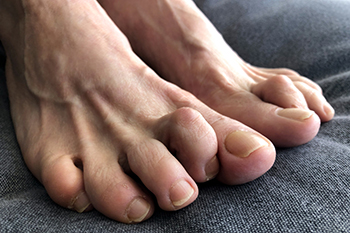159 North 3rd Street
Macclenny, Florida 32063

Ignoring foot pain can lead to serious health issues, as it may indicate underlying conditions including psoriatic arthritis, diabetes, gout, or blood clots. Psoriatic arthritis causes joint pain and swelling, leading to permanent damage if untreated. In diabetes, foot pain might signal neuropathy or the onset of ulcers, necessitating immediate attention to prevent severe complications. Gout manifests as sudden, intense pain due to uric acid crystal buildup, requiring management to avoid chronic joint damage. Blood clots in the legs can cause pain and swelling, posing a risk of life-threatening complications if they travel to the lungs. Addressing foot pain promptly ensures proper diagnosis and effective treatment, preventing minor issues from escalating into serious conditions. If you have foot pain, it is strongly suggested that you schedule an appointment with a podiatrist who can offer effective treatment options.
Foot Pain
Foot pain can be extremely painful and debilitating. If you have a foot pain, consult with Dr. John L. Coleman from Florida. Our doctor will assess your condition and provide you with quality foot and ankle treatment.
Causes
Foot pain is a very broad condition that could be caused by one or more ailments. The most common include:
Diagnosis
To figure out the cause of foot pain, podiatrists utilize several different methods. This can range from simple visual inspections and sensation tests to X-rays and MRI scans. Prior medical history, family medical history, and any recent physical traumatic events will all be taken into consideration for a proper diagnosis.
Treatment
Treatment depends upon the cause of the foot pain. Whether it is resting, staying off the foot, or having surgery; podiatrists have a number of treatment options available for foot pain.
If you have any questions, please feel free to contact our office located in Macclenny, FL . We offer the newest diagnostic and treatment technologies for all your foot care needs.

Heel spurs are bony growths that develop on the heel bone, with the two main types being plantar and dorsal heel spurs. Plantar heel spurs form on the bottom of the heel and are often associated with plantar fasciitis, causing pain and inflammation where the plantar fascia connects to the heel bone. Dorsal heel spurs develop at the back of the heel, typically where the Achilles tendon attaches, leading to discomfort and swelling in the area. Common symptoms of heel spurs include sharp pain while standing up in the morning, tenderness, and difficulty walking or running. Diagnosis usually involves a physical examination and imaging tests like X-rays to confirm the presence of the bony growths. Heel spurs can be painful. If you have developed one, it is suggested that you consult a podiatrist sooner rather than later who can offer you correct relief and treatment options.
Heel spurs can be incredibly painful and sometimes may make you unable to participate in physical activities. To get medical care for your heel spurs, contact Dr. John L. Coleman from Florida. Our doctor will do everything possible to treat your condition.
Heels Spurs
Heel spurs are formed by calcium deposits on the back of the foot where the heel is. This can also be caused by small fragments of bone breaking off one section of the foot, attaching onto the back of the foot. Heel spurs can also be bone growth on the back of the foot and may grow in the direction of the arch of the foot.
Older individuals usually suffer from heel spurs and pain sometimes intensifies with age. One of the main condition's spurs are related to is plantar fasciitis.
Pain
The pain associated with spurs is often because of weight placed on the feet. When someone is walking, their entire weight is concentrated on the feet. Bone spurs then have the tendency to affect other bones and tissues around the foot. As the pain continues, the feet will become tender and sensitive over time.
Treatments
There are many ways to treat heel spurs. If one is suffering from heel spurs in conjunction with pain, there are several methods for healing. Medication, surgery, and herbal care are some options.
If you have any questions feel free to contact our office located in Macclenny, FL . We offer the latest in diagnostic and treatment technology to meet your needs.

Hammertoe occurs when the muscles around the toe joints contract, causing the toe to bend downward at the middle joint, resembling a hammer. This can lead to significant discomfort and the formation of calluses and corns due to friction. Often, it affects the second toe, especially in cases where it is longer than the big toe, leading to pressure and trauma within tight or ill-fitting shoes. High heels and shoes with a narrow toe box can worsen the condition by exerting extra pressure on the toes. Genetic predisposition, bunions, and physical injuries, such as stubbing or nerve damage, can also contribute to the development of hammertoe. Treatment options vary depending on the severity and flexibility of the toe. For mild cases, a podiatrist might suggest wearing shoes with a wider toe box, using adhesive gel pads, or inserting orthotic devices to alleviate pressure. In more severe cases where the toe becomes rigid and painful, surgical intervention may be necessary to restore normal alignment. If you are experiencing pain from a hammertoe, it is suggested that you make an appointment with a podiatrist for an exam and treatment.
Hammertoe
Hammertoes can be a painful condition to live with. For more information, contact Dr. John L. Coleman from Florida. Our doctor will answer any of your foot- and ankle-related questions.
Hammertoe is a foot deformity that affects the joints of the second, third, fourth, or fifth toes of your feet. It is a painful foot condition in which these toes curl and arch up, which can often lead to pain when wearing footwear.
Symptoms
Causes
Genetics – People who are genetically predisposed to hammertoe are often more susceptible
Arthritis – Because arthritis affects the joints in your toes, further deformities stemming from arthritis can occur
Trauma – Direct trauma to the toes could potentially lead to hammertoe
Ill-fitting shoes – Undue pressure on the front of the toes from ill-fitting shoes can potentially lead to the development of hammertoe
Treatment
Orthotics – Custom made inserts can be used to help relieve pressure placed on the toes and therefore relieve some of the pain associated with it
Medications – Oral medications such as anti-inflammatories or NSAIDs could be used to treat the pain and inflammation hammertoes causes. Injections of corticosteroids are also sometimes used
Surgery – In more severe cases where the hammertoes have become more rigid, foot surgery is a potential option
If you have any questions please contact our office located in Macclenny, FL . We offer the newest diagnostic and treatment technologies for all your foot and ankle needs.